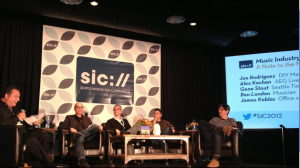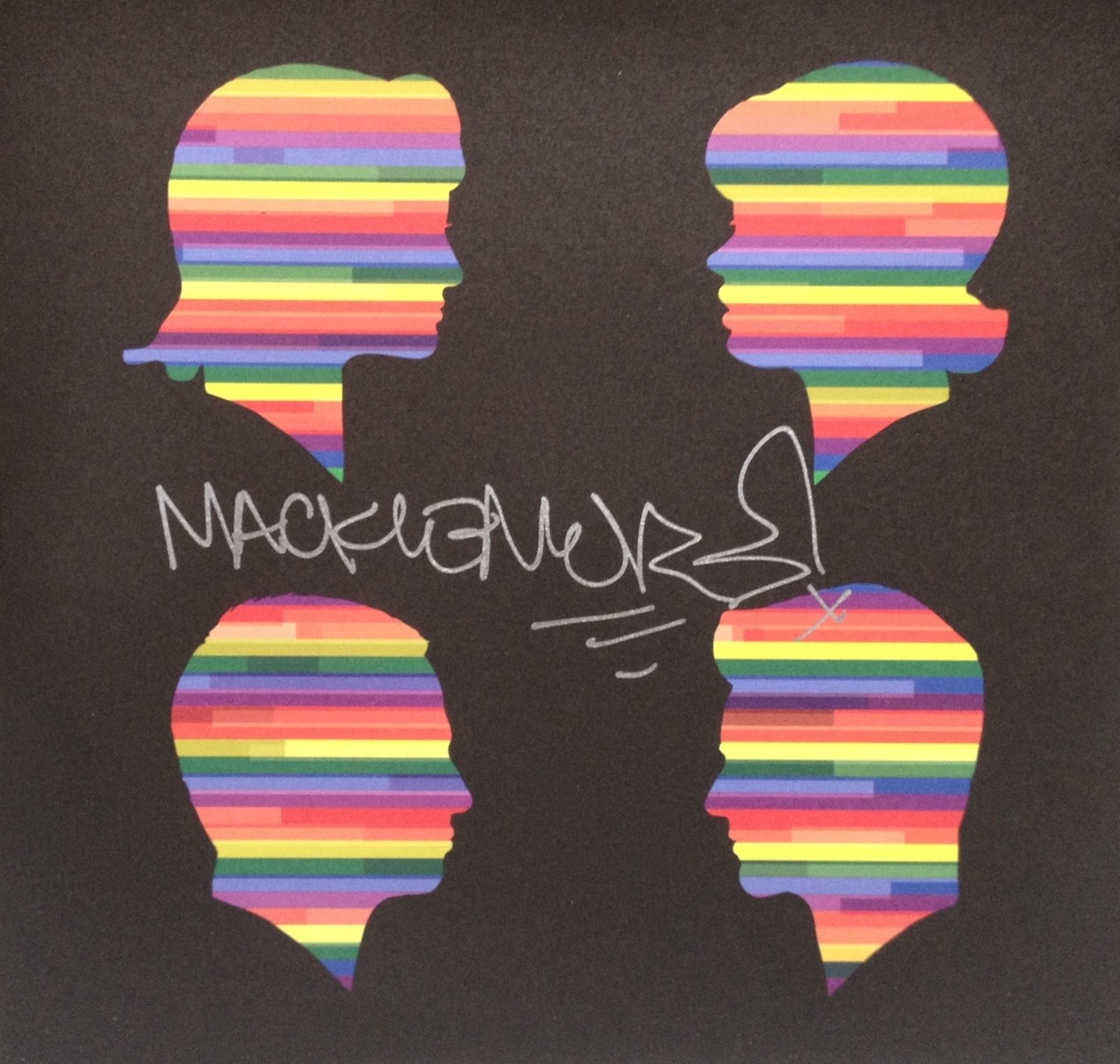 This past Monday and Tuesday, I attended the second annual Seattle Interactive Conference, a mix of presentations, panel discussions, and performance art that centered around the theme of “Game-Changers” in the digital world. And on the third day I rested. My head, and apparently also David Shing’s hair, practically exploded from the firehose of information, insight and interaction at this conference. Interactive was the game, and #SIC2012 was definitely the place to be this week.
This past Monday and Tuesday, I attended the second annual Seattle Interactive Conference, a mix of presentations, panel discussions, and performance art that centered around the theme of “Game-Changers” in the digital world. And on the third day I rested. My head, and apparently also David Shing’s hair, practically exploded from the firehose of information, insight and interaction at this conference. Interactive was the game, and #SIC2012 was definitely the place to be this week.
Presenters and panelists were a diverse mix: entrepreneurs, new media agency professionals, digital visionaries, musicians, venture capitalists, and big corporate marketing executives in the trenches executing on real life campaigns. Themes like mobile, storytelling, relationships, memes, disruptive technologies, the cloud, reinvention and, above all, clever humor, kept popping up like the undead.
“Attention is the new currency – entertain, inform, be useful – or be forgotten,” says David Shing (@shingy, AOL’s “Digital Prophet”, a reporter for Huffington Post, and also a musician, by the way). “Humor and creative presentation win every time,” echoed Ben Huh (@benhuh) of Cheezburger fame.
Having the flexibility to adapt and reinvent yourself was a theme on the first music panel. Actor and humorist John Hodgman (@hodgman) stole the moderator role from musician John Roderick (@johnroderick) while Jonathan Coulton (@jonathancoulton) just smiled and tried to finish his answers. As technology continues to create new ways of interacting with fans, and making money, it’s a full time job for musicians to keep up, as it was tough just to keep up with this panel of entertainers.
 Another music panel admired @Macklemore’s DIY social-media based strategy, and also had a lot to say about how difficult it is for musicians to make real money. Rock Star Motel (@rockstarmotel) is a new Seattle-based startup platform that promises to help musicians keep touring costs down. As Laurel Stearns, A&R at Redlight, pointed out, though, bands should consider building a local fan base first before touring extensively. One important way artist are increasingly making money is not through streaming or even downloads, but through selling merchandise, vinyl and premium CD packages to “super-fans” as done by Barkus Records (@barkusrecords).
Another music panel admired @Macklemore’s DIY social-media based strategy, and also had a lot to say about how difficult it is for musicians to make real money. Rock Star Motel (@rockstarmotel) is a new Seattle-based startup platform that promises to help musicians keep touring costs down. As Laurel Stearns, A&R at Redlight, pointed out, though, bands should consider building a local fan base first before touring extensively. One important way artist are increasingly making money is not through streaming or even downloads, but through selling merchandise, vinyl and premium CD packages to “super-fans” as done by Barkus Records (@barkusrecords).
It’s a nightmare of confusion around digital technologies for many in the music industry: artists, labels, and consumers. Many indie labels are skeptical of social media, although some are beginning to embrace the new digital marketing opportunities. Others seem overwhelmed and are rejecting social marketing as just another fad. Kayla Fairchild (@kaylafairchild) of No Depression was adamant that “Monetization tools exist. Artist and labels are not stepping in to take advantage of them.”
The third panel discussion included Vicki Nauman (@vnvnvnvn), VP North America of UK digital content provider 7 Digital, and Tony Kiewel (@tonykiewel), from the iconic Seattle label Sub Pop. The panel agreed that current copyright and licensing models are crippling efforts to rationalize and streamline the model for artist compensation. Kiewel bemoaned the time spent updating song data every time iTunes and other distributors change their technical requirements. Rob Reid (@rob_reid), one of the original founders of Rhapsody, and now a science fiction novelist, reminded us that the music industry itself actually trained consumers to pirate music early on. We’re all still confused and the model is not frictionless – yet.
Although not music-related, I have to call out David Shing (@shingy) and Jason Silva’s (@jasonsilva) visionary but rapid-fire keynotes. Shing, in big hair and paint-spattered jeans, was also in the hallway during the entire conference, doing 3-camera presenter interviews for Huffington Post in full view of conference attendees – what great theater. Also notable was Ben Huh’s entrance dressed as Psy, dancing the Gangnam Style horsey dance, on the last day, in the last session track. I was stuck in the rather boring Rhapsody presentation, watching the tweets about Huh’s entrance go by and wishing I was in the other room.

Finally, one of the coolest conceptual art pieces was Stanley, the ghostly player piano constructed by Seattle creative agency Digital Kitchen. Stanley took tweeted song requests (@stanleypiano) for two days, the notes echoing up the escalators from floor to floor. An example of creative interaction between people, music and technology, it was a great metaphor for the blending of old technology with new. We have the opportunity to re-imagine new ways of interacting, creating and distributing music in this transformation from analog to digital. It may seem confusing and cluttered, but we are limited only by our imagination and energy.
A few more links below for those who want to read other recaps.
Wunderman Reports on SIC2012: http://www.wundermanreports.com/event/sic
SIC Slideshare: http://www.slideshare.net/seattleinteractive
David Shing Video Interviews on Huffington Post: http://www.huffingtonpost.com/news/sic
Seattle Interactive Conference: Dispatches from a digital world by Berit Anderson: http://crosscut.com/2012/10/30/media/111213/dispatches-digital-world/
Notes from #SIC2012 by Jeff Carroll: http://checkthis.com/sic2012
Barry Hurd’s wrap up: http://paper.li/barryhurd/1351495642#
Ben Huh: How to Create An Internet Meme In Three Easy Steps: http://www.geekwire.com/2012/meme-master-ben-huh/#utm_source=GeekWire+Daily+Digest&utm_medium=email&utm_campaign=78d621bb89-daily-digest-email
Stanley Hainsworth is a Freak’n Genius http://www.freakngenius.com/blog/stanley-hainsworth-is-a-freakn-genius/
Music, Marketing and Macklemore Musings from Wunderman Reports: http://www.wundermanreports.com/music-marketing-and-macklemore-musings



2 comments